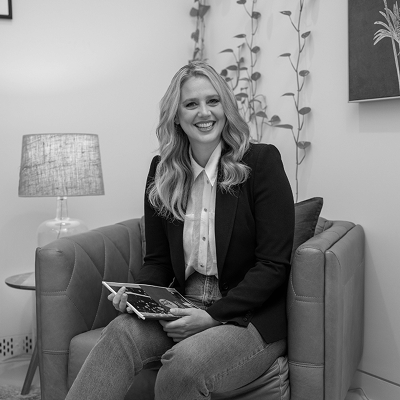
ASKING FOR A FRIEND
As a freelancer, how do you stay on task and juggle different priorities?
ASKING FOR A FRIEND - QUESTION
Struggling to stay focused as a freelancer? In this practical, down-to-earth discussion, Creative Director Sarah Gross and psychologist Tara Hurster explore what it really takes to manage competing priorities, avoid burnout, and get things done without losing your mind. From brain science to real-world strategies, this conversation offers a sustainable roadmap for freelancers who want to work well and live well too
Freelance life is a constant balancing act. One moment you’re deep in creative flow, the next you’re fielding a client call, updating a timeline, replying to emails, and wondering when you last took a proper lunch break. It’s no wonder focus can feel like a rare and fleeting thing.
If you’ve ever felt overwhelmed by competing priorities or stretched thin trying to do it all, you're far from alone. Managing your own business while staying creatively inspired—and emotionally intact—is one of the biggest challenges of freelance work.
This question was unpacked by Sarah Gross, Creative Director and Partner at Storyfolk, who’s lived both the freelance and small studio life, and Tara Hurster, psychologist and founder of The TARA Clinic, who works with high-performing professionals navigating stress, burnout, and big decisions. Andy Wright, founder of Never Not Creative and CEO of Streamtime, hosted the chat.
When boundaries blur and your brain won’t switch off
Sarah speaks to the freelancer’s familiar dilemma:
"As creatives we put so much of ourselves in our work that it’s hard to set a clear boundary. At times, work and life just blur together."
And it’s not just the hours. Creative thinking doesn’t clock off.
"You’ll be at home, walking your dog, having a shower—and ideas just keep coming," she says.
It’s the gift and the curse of a creative brain: always on, always ticking.
Make rest part of the plan (not an afterthought)
To stay grounded and focused, Sarah recommends building in time to reset—on purpose.
"Plan time away from the computer—whether it’s walking, going to the beach, yoga... or axe throwing if that’s your thing."
This kind of rest isn’t a luxury. It’s essential.
And you have to schedule it like you would a client meeting. Because no one else is going to protect that time for you—but future you will thank you for it.
Prioritise what really matters (not just what’s loud)
When everything feels urgent, Sarah suggests coming back to this:
"What’s most important to the business today? And where can I add the most value?"
It’s a shift from “What can I get done?” to “What’s worth doing right now?”
And that mindset can bring a whole lot more clarity than another colour-coded to-do list.
Why the right tools matter
Staying on task isn’t just about willpower—it’s also about how you structure your work. This is where Streamtime comes in.
Unlike traditional project management tools that focus on tracking every billable minute, Streamtime is built with something more sustainable in mind: productive wellbeing.
That means helping you plan your day with intention, not pressure. Giving you visibility over your workload, not just your deadlines. And letting you track time without a timesheet.
The goal isn’t to squeeze more out of your day—it’s to help you focus on what matters, get it done well, and still log off in time for dinner. Because being productive shouldn't mean being permanently exhausted.
Don’t go it alone—freelance doesn’t mean solo
Sarah also reminds us of the power of collaboration:
"Even as a freelancer, you don’t have to do it all yourself."
Storyfolk itself was born out of two freelancers joining forces. Whether it’s sharing the workload, bouncing ideas, or simply checking in with someone who gets it, support matters.
"If things feel overwhelming, talk to someone. It could be a creative mate or someone outside the industry. Just getting it out can make a world of difference."
Why overwhelm makes focus harder (it’s not just you)
Tara breaks down what’s actually happening in our brains when we’re juggling too much:
"When your threat response is triggered—when you’re stressed—your logical brain shuts down."
That’s why even simple decisions feel impossible when you’re overwhelmed. It’s biology, not failure.
"You’re not lazy, you’re in survival mode," she explains. And what your brain needs isn’t more pressure—it’s support and regulation.
Two reset buttons your brain will thank you for
So how do you reset your brain when it’s short-circuiting?
Tara suggests two practical tools:
- Mindfulness
Being aware of what’s happening in your body, your thoughts, and your environment gives you back some control. Even small pauses make a difference. - Movement
Short bursts of exercise can help tell your brain the threat has passed.
But go easy on yourself—"If you’re already fried, high intensity might make things worse," Tara says.
Try a walk, a gentle stretch, something your nervous system can actually handle.
Let go of perfect days
Some days, the work just doesn’t land. You’re not feeling it. You’re spinning your wheels.
Sarah says that’s okay:
"Sometimes it’s just not the day for deep focus or big creativity. And that’s okay. Tomorrow is a new day with a new mindset."
Giving yourself permission to have off-days can actually reduce the pressure that creates them.
Finding a rhythm that works for you
Staying on task and juggling priorities isn’t about squeezing more into your day. It’s about building a rhythm that’s sustainable—one that works with your brain, your energy, and your creative flow.
It means taking breaks when you need them. Asking for help. Using tools that honour your time and support your wellbeing.
Whether you’re freelancing solo or building something bigger, the goal is the same: do good work, feel good doing it, and still have something left in the tank at the end of the day.
our guests
Industry Leader

Sarah Gross
Storyfolk
Mental Health Expert

Tara Hurster
Host

